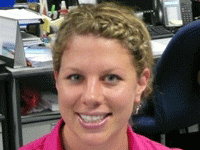
Acing the interview
Consultant Aimee Young says you can ensure that you ace your next interview by following just a few simple tips.
After years of preparing candidates for interviews (not to mention attempting to prepare myself for interviewing overseas when I moved from Canada to Singapore in 2008), I have come to realize that no matter how long you have been on the other side (as a recruiter) or how successful you become in your career, you never forget that cringe-inducing interview that you didn't prepare properly for. Maybe you had the wrong information, went blank on the first question, or drifted completely off-topic on an unrelated matter that left the interviewers looking at their watches...
The good news is that this doesn't have to happen to you!
By following just a few simple tips, you can ensure that you ace your next interview:
RESEARCH, RESEARCH, RESEARCH: I have capitalised this because it's the most important thing you can do to eliminate surprises, establish confidence and ensure that you have a great interview. Make sure you know as much as possible about the company, the people you'll be meeting with and the specifics on the role you're interviewing for. The internet can serve as your best friend in this respect, and there are many social networks such as LinkedIn to help you to find out some of these ‘insider’ information.
Bring a copy of your CV: Maybe even bring two. Never assume that your interviewer will have a copy. In addition to serving as your most important sales ‘prop’ for the conversation, you will look extra prepared for those times where they do not have a copy.
Know your CV inside and out: Dates, titles, key achievements, everything— it’s all important even if some of the experiences are dated. If you look like you have forgotten parts of your own history or can’t account for gaps of time between jobs you run the risk of looking like you are being untruthful, which can be fatal in an interview setting.
Find out the name and title of the person you are meeting: It’s also good to know how they would interact with you in the role if you were to get the job. This is not always possible, but there is nothing wrong with asking whoever is setting up the interview (recruiter or hiring manager) a few exploratory questions beforehand. Once you have some basic details on your interviewer, research them on the internet (Google, LinkedIn profiles, etc) to see what else you can gather about them. You may have something in common without knowing it!
Dress for the job you want NOT the job you have: It is always better to be overdressed than underdressed.
When you're asked for examples from previous positions, remember that it is okay to include your whole career: Many people, when asked for examples of projects, situations or challenges tend to place more focus on their current or latest position. If you accomplished something great two positions ago, include it!
Make sure you understand the question– and the competencies they're looking for: The questions you're being asked are designed to garner information about your competencies, so take a moment to figure out what they're trying to get at– and how you can best answer it. Don’t be afraid to ask for clarifications if the questions are too vague. Additionally, when you are giving answers, keep in mind the most important part of each of your past roles is what you were able to achieve. Tasks you did or actions you took are fine, but in the current economic environment, everyone is looking for people who are going to deliver real results to their organisation… so don’t leave that out!
Make a list of the questions you want to ask: If you've done your research, you should have a number of questions about the organisation and/or the role. This is vital. In this business I have seen people turned down for roles simply because they had no questions for the interviewers. The reason? "How can they make a proper decision on their career without asking for more information?"
Be POSITIVE: Even if you didn’t enjoy your last job/boss/everything about your daily work, don't speak negatively about it. How you handled your last position, good or bad and how you speak about it now gives the interviewer an insight into how you will speak about him/her and their organisation when you leave.
Make sure you thank the person for their time: You can also ask when you can expect to hear from them. This will allow you to gauge interest and timelines and without it, you won't be able to judge how to approach other opportunities.
Most importantly, RELAX: The most important thing is to be yourself, which will give everyone a better idea of whether you and this job would go well together.
The conversation will essentially be about you and the company/role, so take your time, know your resume (and yourself) and know the company. If you are relaxed, you will be able to present yourself in the best light.
Ms. Aimee Young
Consultant (Secretarial & Business Support division)
Robert Walters
























 Advertise
Advertise










